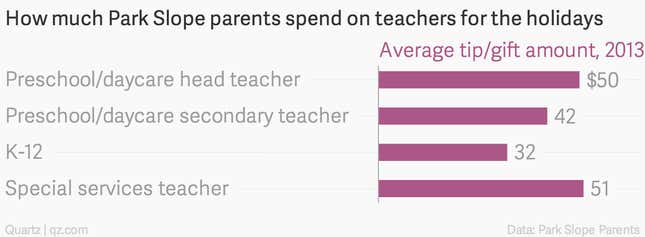The holidays are swiftly approaching, and for many families that means a lot of people to tip: the doorman, the housecleaner, the newspaper delivery person, to name a few. But what about the person you trust to mold your child’s mind?
Showing appreciation for your child’s teacher can get tricky. Do you give a teacher cash? How much do you give? And what if your little darling has seven teachers?
Well, first of all, you don’t actually need to give anything
Most Americans said they didn’t give gifts or tips to teachers for the holidays in 2013, according to a Consumer Reports survey. The teachers Quartz spoke to said they don’t expect holiday gifts from students, though they appreciate the gesture.

But why not give something?
Teachers do not make a lot of money, and an end-of-year gift to show your appreciation of all they do for your child is a nice gesture, says Maralee McKee, a manners and etiquette teacher and parent of two from Florida.
“Who else do you want to thank more than your child’s teacher, who spends more waking hours with your child than you do?” she asks. “It’s a vital relationship and one that needs to be nurtured.”
Some parents may look for reasons not to give anything to a teacher for the holidays, but McKee urges them to get over that, especially amidst the general excess of the holiday season. “If you’re being frugal, then being frugal limits what you purchase for yourself,” McKee says. “Being stingy limits what you purchase for others.”
First, find out what’s permissible
States, school districts, and even individual schools all have different rules when it comes to teacher gifts. Some states have laws prohibiting teachers from accepting gifts. So email the head of the parents’ association or the room parent, or call the school’s front desk to find out the policy.
How much should you give?
The median value of the gifts parents gave teachers in the US in 2013 was $20, according to the Consumer Reports survey. But like most things, the norm depends where you live and where your child goes to school. If you’re paying $18,000 for tuition, spending $150 to $200 isn’t absurd, McKee says. But in a public school, that price tag might be excessive.
In one of New York City’s wealthier neighborhoods, Park Slope in Brooklyn, a parents group conducts an annual poll to find out how much parents are tipping:

Don’t give cash
Even if it is legal, handing over an envelope of cash is generally considered inappropriate. It can come off as a bribe or make the teacher feel awkward, according to both McKee and the etiquette titans at the Emily Post Institute.
The only time cash is acceptable is if a parents’ group or enterprising parent collects cash for a group gift, or a group gift certificate, for the teacher. In that scenario, the students all give the gift together, and individual contribution levels aren’t divulged.
Presents no teacher wants
If you’re going to go to the effort of buying something, it might as well be a gift the teacher will use. Avoid mugs, and anything that’s shaped like an apple (unless you know for a fact that the teacher has a special fondness for apples). Teachers get a lot of these cliche “#1 teacher!” items every year, and they accumulate.
Stay away from overly intimate items such as clothing. And skip the ornaments and home decorations, when you likely have no idea of the recipient’s preferred style, McKee says.
Be careful with food—some teachers tell Quartz they enjoy baked goods and homemade food, while others say they prefer to stay away from it, because of dietary restrictions, allergies or just not knowing where the food came from. One teacher, Sadie Wright-Ward, shared this cautionary tale with the Boston Globe: “He came in, sniffling and feverish, just so he could give me a carrot cake that he’d made himself,” she said. “Nice thought, but it went right in the trash.”
If you can’t resist giving a food gift, be sure to find out about preferences or allergies first.
Go for a gift card
A gift card is a great idea, but make sure it’s one that the teacher will use—perhaps for a book store, coffee shop, or movie theater. For a restaurant, make sure the card is enough to cover the price of a meal, and for stores, the price of an item.
A gift card to a school supply store can also be helpful. Many schools are underfunded and teachers spend money out of pocket on their students. Last school year, US teachers spent an average of $513 of their own money on “classroom supplies, instructional materials, books for their classrooms, and professional development.”
There’s no need to buy a dozen gifts
In elementary school, it makes sense to give your child’s primary teacher a gift. Once students reach middle school or high school and can have up to seven teachers, it’s unnecessary to gift every one. Ask your child to choose the one or few she’s closest to or learns the most from, and remind your child not to deliver the gift when other (less gifted) teachers are around.
In elementary school, if you want to give secondary teachers—the classroom aide, physical education teacher, arts teacher—something as well, the gift doesn’t need to be as high in value as what you give the primary teacher, since they spend so much less time with your kid, McKee says.
Give your child a chance to do the gifting
A gift doesn’t have to cost money to send a message. Have your child write a note to his teacher for the holidays, expressing gratitude and specifying one or more way in which he has learned or enjoyed himself in the classroom. That’s often the kind of thing teachers will keep and go back to.
“The best gift is a note from a student saying thank you for what I do and/or sharing what impact being in my class has had on them,” Larry Ferlazzo, a Sacramento teacher, tells Quartz in an email. ”One memorable note from a student said ‘One thing that I’ll always remember about you is that you never, ever let me fail.'”




